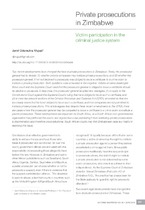Private prosecutions in Zimbabwe: Victim participation in the criminal justice system
Abstract
Two recent developments have changed the face of private prosecutions in Zimbabwe. Firstly, the prosecutorgeneral
had to decide: (1) whether private companies may institute private prosecutions; and (2) whether the
prosecutor-general, if he had declined to prosecute, was obliged to issue a certificate to a crime victim to
institute a private prosecution. Both questions were answered in the negative. Victims of crime challenged
this in court and the Supreme Court ruled that the prosecutor-general is obliged to issue a certificate should
he decline to prosecute. In response, the prosecutor-general adopted two strategies: (1) to apply to the
Constitutional Court against the Supreme Court’s ruling that he is obliged to issue such a certificate; and
(2) to have the relevant sections of the Criminal Procedure and Evidence Act (CPEA) amended so that the
law clearly states that he is not obliged to issue such a certificate, and that companies are not permitted to
institute private prosecutions. This article argues that despite these recent amendments to the CPEA, there
are cases where the prosecutor-general may be compelled to issue a certificate to a crime victim to institute a
private prosecution. These developments are important for South Africa, as a South African non-governmental
organisation has petitioned the courts and argued that a law prohibiting it from instituting private prosecutions
is discriminatory and therefore unconstitutional. South African courts may find Zimbabwean case law helpful in
resolving this issue.

